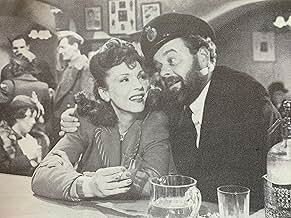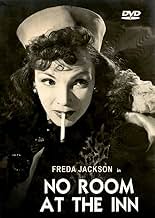Duas crianças são evacuadas durante a Segunda Guerra Mundial e colocadas sob os "cuidados" de uma mulher alcoólica.Duas crianças são evacuadas durante a Segunda Guerra Mundial e colocadas sob os "cuidados" de uma mulher alcoólica.Duas crianças são evacuadas durante a Segunda Guerra Mundial e colocadas sob os "cuidados" de uma mulher alcoólica.
- Direção
- Roteiristas
- Artistas
Marie Ault
- Vicar's Maid
- (não creditado)
Vera Bogetti
- Barmaid
- (não creditado)
- Direção
- Roteiristas
- Elenco e equipe completos
- Produção, bilheteria e muito mais no IMDbPro
Avaliações em destaque
I was Ronnie and my stage name was Stanley Conett (Stanley Heinemann) I played that part for 427 performances at the Winter Garden. Then toured England and Scotland with the show. Also I did the BBC version.It is a pity that you have published the wrong actor's name for the Winter Garden version of the show.
I was too tall to be in the film version. The Theater version often caused the audience to erupt with shouting and curses at Fred Jackson. The show ended with the girls suffocating Mrs.Voray and it was different in the movie.
Ref -corrected version in Wikipedia.
Yes i was in the same boat.With a dragon of a woman chasing my sister brother and me, i think for her sport.The scene that stands out for me was when one of them say's You.v Broke Me Bleed-en feather.I remember very well the war years.Three of my cousins were buried alive in the blitz of Portsmouth.Being a naval port it got it's share.We ended up living in tent's courtesy of the army.I think this film depicted some of the deplorable situations that children were placed in.I think the small amount of comedy gave it the lift it so badly needed.I know it made an everlasting impression on me.I wonder if by to-days standards it would have won Best Picture Of The Year.I should think so.
When I saw the film the first time I was scared out of my wits by Mrs Voray. I could empathize with evacuee children as some of them came to my town at the end of the war. The film can be viewed in full length on the Internet these days. As an adult I interpret the film as the interplay of myth and social realism. Mrs Voray has the attributes of a witch even in her looks but more significantly in her power to bewitch town worthies and others by her smarmy insinuations and false charm. I agree with another reviewer that the film recalls the world of the Grimm brothers, Hansel and Gretel particularly. Dylan Thomas was intrigued by images drawn from the world of witches and sinister occult practices. What saves the play from being a moralizing allegory is its keen almost Dickensian observation of people as they are, foibles and all.
I saw this film years ago as a child and it stuck in my memory, so when it appeared on TV on the Talking Pictures channel, I watched it again. Of course some of the acting is over the top, tipping into caricature. But the children are brilliant. Joan Dowling steals the film and it is sad that she committed suicide in the early fifties, as she had so much to give. An aunt had tales to tell of similar experiences as an evacuee and there is a moral to the film as the do gooders turn a blind eye when asked to help. The denouement is a bit mellow dramatic and the film ends suddenly which is a bit odd, especially as the story is told in flashback, one of the children as an adult is recounting it. We needed a bit more of the scenes from the beginning revisited at the end. Still I enjoyed seeing it again.
A full-blooded post-War British melodrama set during World War 2, adapted from a stage play, co-scripted by Dylan Thomas and directed by Daniel Birt (see also THE THREE WEIRD SISTERS) and starring hatchet-faced Freda Jackson as wicked landlady Mrs Voray who takes in orphaned children and spends their allowance on drink and finery. Narrated in flashback by Mary O'Rane (Ann Stephens) as she recalls the experiences that turned both her and fellow orphan Norma Bates (get that name!), played by feisty Joan Dowling, into petty thieves, this has apparently been considerably opened out by co-scripter Thomas, to take in a less than thinly veiled attack on Church and State, as well as the kind of class hypocrisy that allowed middle-class types to tut-tut behind their net curtains at the dirty-faced urchins and carousing working-class slatterns, whilst simultaneously cooking up barely credible excuses not to take the hapless youngsters in; even when begged by a selfless and community-spirited young schoolmistress. Described at the time by 'Today's Cinema' as a '...completely sordid canvas...' and a work of '...cruelty which has no parallel on British screens...', this was clearly strong meat in its day and, even though time has dimmed much of its initial power and rendered some of its sentiment a shade sugary, its theatrics a trifle hammy and its portentous religious overtones somewhat trite and banal, this is still an undeniably downbeat tale of often almost Victorian squalor. Partially leavened by occasional shafts of wit (e.g. Voray recalls her ex-husband 'Nobody bothered about his family tree - except the dogs'), humorous comic stereotypes and sharp-tongued kids, this still packs a fair wallop; thanks in no small measure to Jackson's vividly etched turn as the kind of vicious and spiteful harridan who appears to have stepped out of a tale by the Brothers Grimm. Definitely worth a look for those interested in the often overblown, but nevertheless entertaining, school of post-War British genre cinema.
Principais escolhas
Faça login para avaliar e ver a lista de recomendações personalizadas
Detalhes
- Data de lançamento
- País de origem
- Idioma
- Também conhecido como
- Cendrillon du faubourg
- Locações de filme
- Empresa de produção
- Consulte mais créditos da empresa na IMDbPro
- Tempo de duração1 hora 22 minutos
- Cor
- Proporção
- 1.37 : 1
Contribua para esta página
Sugerir uma alteração ou adicionar conteúdo ausente

Principal brecha
By what name was No Room at the Inn (1948) officially released in Canada in English?
Responda





















